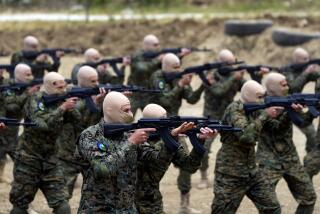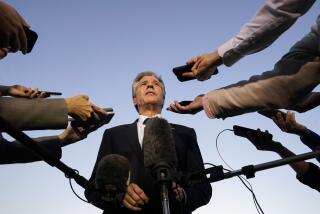Brick by Brick
- Share via
The coalition needed to find Osama bin Laden and disrupt or destroy his Al Qaeda network continues to build. With admirable patience, Washington is pressing forward on diplomatic, economic and military fronts. But the larger fight against terrorism will be long, and the alliances along the way are likely to be ever-shifting, patchwork affairs.
The end of the Cold War left the United States the only superpower. People may argue about whether that’s good or bad, and it’s not to say that this country must be the world’s policeman. But it was the United States that was attacked Sept. 11, and it’s the United States that is best equipped to coordinate the search for terrorists. The nation also cannot act alone. If the superpower somehow was able to identify and find its enemies on its own and then marched in to crush them, world support would vanish.
Some coalition members will be unwilling to support some initiatives, such as short-term plans to remove the Taliban regime in Afghanistan and potential longer-term aims of changing Saddam Hussein’s government in Iraq. Washington should pay attention to objections from its partners and try to keep as many nations as possible in the coalition. If the objections cannot be overcome, there’s no choice but to let a nation leave.
It took months to assemble the partners in the 1991 Gulf War, when interests across the Middle East were clearly threatened after one Arab nation invaded another. This effort is many times the magnitude, and being built with lightning speed in comparison.
The alliance already is producing results. Suspected terrorists have been arrested around the globe and governments are sharing intelligence information. Many countries desperately want to neutralize Al Qaeda, the international terror organization led by Bin Laden. Intelligence officers say that even when it does not exercise direct control, Al Qaeda provides support to Islamic extremist groups in other nations.
Beyond dealing with Al Qaeda, agreement among members comes harder. Washington needs to have a good idea of what will follow the Taliban in Afghanistan if that regime, host for five years to Bin Laden, is toppled. Afghanistan’s people are already in desperate need. The past two weeks have seen hundreds of thousands on the move, seeking refuge inside or outside their country. Millions more already are in refugee camps in Pakistan and Iran. A long civil war has been followed by four years of drought. With winter near and planting for next spring forgone, starvation will be even more likely than before.
The United Nations is experienced in dealing with refugees and famines, and nations uncomfortable with U.S. leadership may be more willing to let the U.N. show the way. The U.N. has swept up capably after wars in Cambodia, East Timor and Kosovo. If Washington sticks to its pledge to avoid “nation-building,” the United Nations is a good candidate to undertake the job, at least in the early stages.
Greater difficulties will arise further down the line, as the United States decides how to follow through on rhetoric about cracking down on nations that support terrorist groups or allow them bases. Iraq would be an obvious target, at which point chunks of the coalition would drop off. Middle Eastern countries would object to a U.S. attack on another Arab nation, which Iraq is and Afghanistan is not.
The anti-terror effort requires allies of convenience, accepting nations that would not have been welcomed to the fold three weeks ago. The support so far is impressive, from China and Russia, NATO and Central Asia. The debate within the Bush administration over the necessary size of a coalition and what nations should be included can help to sharpen immediate goals and the overall strategy in fighting terrorism. What’s indisputable is the coalition’s value.
More to Read
Sign up for Essential California
The most important California stories and recommendations in your inbox every morning.
You may occasionally receive promotional content from the Los Angeles Times.










